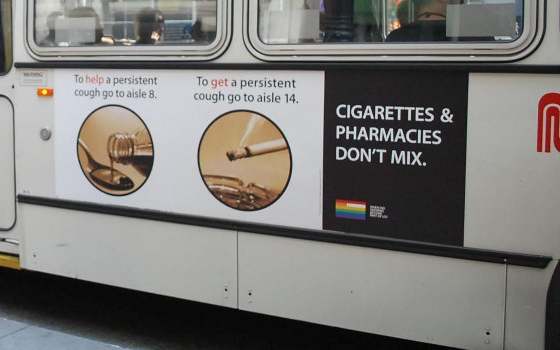- MENU
- HOME
- SEARCH
- WORLD
- MAIN
- AFRICA
- ASIA
- BALKANS
- EUROPE
- LATIN AMERICA
- MIDDLE EAST
- United Kingdom
- United States
- Argentina
- Australia
- Austria
- Benelux
- Brazil
- Canada
- China
- France
- Germany
- Greece
- Hungary
- India
- Indonesia
- Ireland
- Israel
- Italy
- Japan
- Korea
- Mexico
- New Zealand
- Pakistan
- Philippines
- Poland
- Russia
- South Africa
- Spain
- Taiwan
- Turkey
- USA
- BUSINESS
- WEALTH
- STOCKS
- TECH
- HEALTH
- LIFESTYLE
- ENTERTAINMENT
- SPORTS
- RSS
- iHaveNet.com

by Jules Witcover
Americans' addiction to harmful drugs is in the news again in a big way. The nation's largest cigarette-selling pharmacy firm, CVS Caremark>, has decided to stop peddling them at its 7,600 stores. Larry J. Merlo, its chief executive, explained that "cigarettes and tobacco products have no place in a setting where health care is delivered."
CVS, he said, employs "about 26,000 pharmacists and nurse practitioners helping patients manage chronic problems like high cholesterol, high book pressure and heart disease, all of which are linked to smoking."
The decision is being hailed by the
In an unrelated story, the death from apparent drug overdose of film actor Philip Seymour Hoffman has simultaneously grabbed newspaper and television headlines across the country. Accounts have focused as much or more on his acting skills as on his longtime history of, and relapse into, drug addiction.
Meanwhile, out in Colorado, the legalization of the sale marijuana has created more than a cottage industry there, amid a renewed debate on whether its use leads to serious physical and mental deterioration and is a peril to young smokers.
But it is the danger of addiction to cigarettes among America's youth that continues to drive federal government policy. That is so even as the growing of quality tobacco as a particular American industry remains a staple of American farming, especially in the South, most notably in states like North Carolina.
The obvious conflict between federal support of the industry even as the government professes to oppose use of its product was comically illustrated nearly 40 years ago in Jimmy Carter's administration. His secretary of health, education and welfare, Joe Califano, was leading a prominent anti-smoking drive at the time.
Carter, campaigning in North Carolina for the election of a prominent Democratic candidate for governor, gingerly touched on the sensitivities of the local tobacco interest. He declared that, as a result of Califano's efforts, "cigarette smoking will be even safer than it is today!"
Califano's current successor as secretary of health and human services, Kathleen Sebelius, applauded the CVS decision, citing the continuing threat of youth addiction. She said 3,200 Americans a day under age 18 will try their first cigarette and 700 will become addicted, and that 5.6 million children alive today will die prematurely of diseases related to smoking.
A spokesman for the
Nevertheless, the long federal government campaign against the use of tobacco products has been remarkably successful in the United States, according to the
There was a time in this country, as viewer of old movies on television will attest, when, smoking was commonplace and an essential confirmation of masculine toughness in gangster films and of feminine sophistication in glamour flicks. But much less so now.
Instead, hard drug use, as in the new Leonardo DiCaprio sex-and-porn overdose, "The Wolf of Wall Street," pollutes the silver screen.
WORLD | AFRICA | ASIA | EUROPE | LATIN AMERICA | MIDDLE EAST | UNITED STATES | ECONOMICS | EDUCATION | ENVIRONMENT | FOREIGN POLICY | POLITICS
Article: Copyright ©, Tribune Content Agency, LLC.
"Americans Shunning the 'Evil Weed' and Embracing Another "